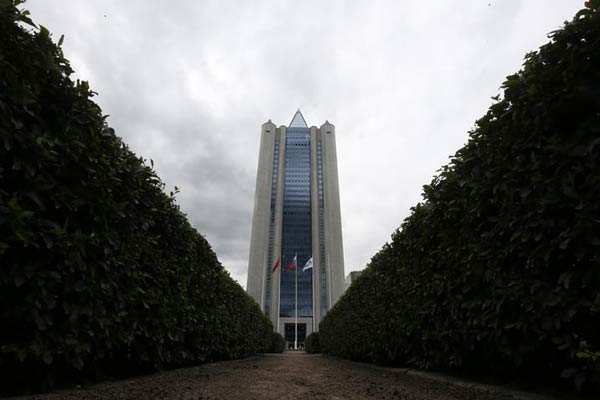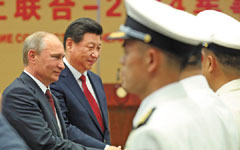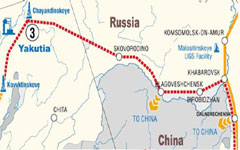 |
|
The headquarters of Gazprom is seen on June, 27, the day of the annual general meeting of the company's shareholders in Moscow. Russia's Gazprom plans to build a gas pipeline to China using its own financial resources, Deputy CEO Vitaly Markelov told the State-controlled company's annual general meeting on Friday. REUTERS |
China and Russia on Monday started the construction of a joint natural gas pipeline in Russia's eastern Siberia, as they implement a natural gas supply contract signed between the two countries.
Chinese Vice-Premier Zhang Gaoli and Russian President Vladimir Putin jointly witnessed the welding of the first roll of pipes on the Russian side of the China-Russia East Route natural gas pipeline in Yakutsk, the capital city of Russia's Sakha (Yakutia) Republic.
At a start-of-construction ceremony at the Us-Khatyn field on the outskirts of Yakutsk, Zhang and Putin were observed by crowds of people from both countries, as a live video feed from the Chayandin gas field some 1,000 kilometers away was displayed on huge screens.
The Chayandin and Kovyktin gas fields in eastern Siberia will become major sources of supply when the pipeline begins to pump natural gas to China in 2018.
 |
 |
At their meeting in Shanghai in May, the presidents witnessed the signing of a number of groundbreaking contracts between companies of the two countries, aimed at annually supplying 3 million metric tons of liquified natural gas.
Xi and Putin agreed to "establish a comprehensive energy cooperation partnership" at their meeting, Gazprom Chairman of the Board of Directors Alexey Miller said on Saturday.
"We are making an all-out effort to implement the consensus reached between President Putin and President Xi Jinping," Miller said.
The Russian part of the joint - venture, which starts at the Kovyktin and the Chayandin gas fields, will extend through existing pipelines in eastern Siberia and end in the Far East port city of Vladivostok.
The China-Russia East Route natural gas pipeline will be jointly built by China National Petroleum Corp and Gazprom of Russia, with the latter being responsible for building the part within Russian borders.
The Russian part of the pipeline, officially called the "Power of Siberia" pipeline, has designed capacity of 61 billion cubic meters of natural gas every year.
According to a CNPC-Gazprom contract, the Russian side will export 38 billion cubic meters of gas to China through the pipeline every year for 30 years, starting in 2018.
Fast-growing energy cooperation has become a core ingredient of the China-Russia strategic cooperative partnership and has helped advance it into a new era of development. In addition to the East Route gas pipeline, the two countries are in negotiations on the construction of the West Route gas pipeline.
Under the CNPC-Gazprom agreement, the Russian side will export 70 billion cubic meters of natural gas to China every year upon completion of both the East-and West-Route gas pipelines.
The two sides have also jointly built and put into operation a China-Russia oil pipeline in the Far East. In 2013, China imported 24.35 million tons of crude oil, 27.28 million tons of coal and 3.5 billion kilowatt hours of electricity from Russia.
Russian Deputy Prime Minister Arkady Dvorkovich said earlier this year that Russia has the capacity of tripling or quadrupling the current volume of electricity and coal exports to China.
CNPC and Russian oil giant Rosneft will also build a joint-venture oil refinery in Tianjin in North China, which will be able to process 16 million tons of crude oil every year.
And the China-Russia joint-venture Tianwan nuclear power plant in East China already has put two reactors into trial operation, with two more under construction.
